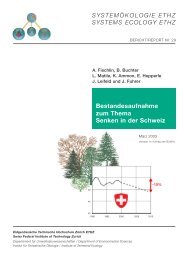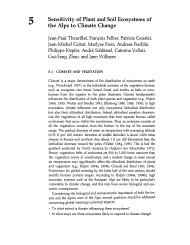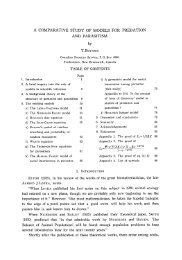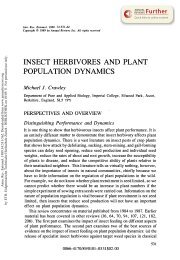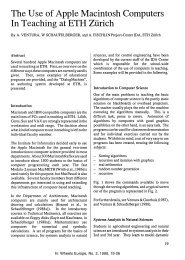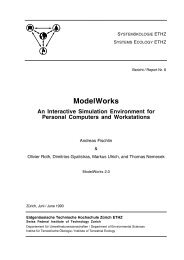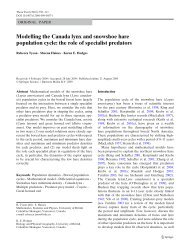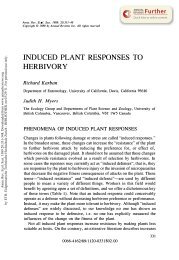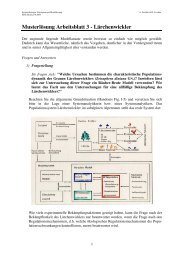On the Ecology of Mountainous Forests in a Changing Climate: A ...
On the Ecology of Mountainous Forests in a Changing Climate: A ...
On the Ecology of Mountainous Forests in a Changing Climate: A ...
You also want an ePaper? Increase the reach of your titles
YUMPU automatically turns print PDFs into web optimized ePapers that Google loves.
Introduction 11<br />
The ma<strong>in</strong> advantage <strong>of</strong> FORECE was its capability to produce species compositions accord<strong>in</strong>g<br />
to phytosociological descriptions <strong>of</strong> <strong>the</strong> forests under study (Ellenberg & Klötzli<br />
1972). Important disadvantages were that it was one <strong>of</strong> <strong>the</strong> more complex models at that<br />
time, and that it did not <strong>in</strong>clude soil carbon dynamics, which would be important for calculat<strong>in</strong>g<br />
<strong>the</strong> carbon balance <strong>of</strong> forest ecosystems (Pastor & Post 1985). In <strong>the</strong> meantime,<br />
two more models have been developed for European conditions: SIMA (Kellomäki et al.<br />
1992), a slightly modified version <strong>of</strong> <strong>the</strong> LINKAGES model (Pastor & Post 1985), and<br />
FORSUM (Kräuchi & Kienast 1993, Kräuchi 1994), a successor to FORECE <strong>in</strong>clud<strong>in</strong>g detailed<br />
submodels <strong>of</strong> soil water dynamics, deer brows<strong>in</strong>g, and management.<br />
1.5 Objectives <strong>of</strong> this study<br />
Based on <strong>the</strong> research conducted with forest gap models by many authors dur<strong>in</strong>g <strong>the</strong> last<br />
25 years and <strong>the</strong> apparent success <strong>of</strong> <strong>the</strong>se models for simulat<strong>in</strong>g realistic species composition,<br />
this <strong>the</strong>sis shall address <strong>the</strong> follow<strong>in</strong>g questions:<br />
First, do complex forest gap models like FORECE produce plausible simulation results for<br />
<strong>the</strong> right reasons? Do <strong>the</strong> factors that are most important for simulat<strong>in</strong>g forest dynamics<br />
correspond to our ecological knowledge on those dynamics, or do <strong>the</strong>se complex models<br />
simply represent empirical parametrizations assembled dur<strong>in</strong>g decades <strong>of</strong> model development<br />
without evident relationships to ecological <strong>the</strong>ory?<br />
Second, what is <strong>the</strong> m<strong>in</strong>imum number <strong>of</strong> assumptions, i.e. ecological factors, that must<br />
be <strong>in</strong>corporated <strong>in</strong> such a model to simulate realistic dynamics <strong>of</strong> mounta<strong>in</strong>ous forests? Is<br />
it possible to simplify some <strong>of</strong> <strong>the</strong> rema<strong>in</strong><strong>in</strong>g equations, and can <strong>the</strong> parameter space <strong>of</strong><br />
<strong>the</strong> models be reduced fur<strong>the</strong>r by skilful group<strong>in</strong>g?<br />
Third, do forest models like FORECE conta<strong>in</strong> implicit assumptions about climate, so that<br />
<strong>the</strong>ir validity is restricted to simulat<strong>in</strong>g forest dynamics at specific sites and under current<br />
climate only? If this is true, can <strong>the</strong>se assumptions be replaced by explicit formulations <strong>of</strong><br />
climatic <strong>in</strong>fluences, so that <strong>the</strong> models are applicable along climate gradients and under a<br />
chang<strong>in</strong>g climate as well?<br />
F<strong>in</strong>ally, how sensitive is <strong>the</strong> simulated species composition <strong>of</strong> near-natural forests <strong>in</strong> <strong>the</strong><br />
European Alps to <strong>the</strong> climatic change anticipated for <strong>the</strong> next 100 years as compared to<br />
<strong>the</strong> climatic changes that have occurred <strong>in</strong> <strong>the</strong> last 500 years?



